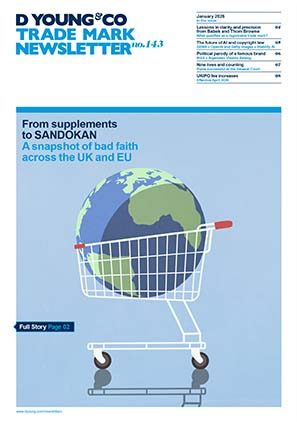Small sales, (just) enough evidence: 132 perfume sales reverse non-use finding
The European Union Intellectual Property Office (EUIPO) Board of Appeal partially annulled a decision that revoked Laurice El Badry Rahme Ltd’s (Laurice) EU trade mark (EUTM) for BOND NO. 9 MANHATTAN, on the basis that sales of 132 bottles of perfume across a three-year period were sufficient to demonstrate genuine use of the trade mark.
Background
The Bond No. 9 MANHATTAN mark was registered for various goods in classes 3 and 4, including cosmetics, fragrances, and scented candles. Roja Parfums Holdings filed a non-use cancellation action against the mark under Article 58(1)(a) European Union Trade Mark Regulation (EUTMR). At first instance, the EUIPO revoked the mark in its entirety, noting that the extent of use evidence was “manifestly insufficient”.
Laurice appealed the decision in relation to perfumery, fragrances for personal use, perfumes and eau de parfums in class 3.
Decision
The Board of Appeal ruled that the appeal was “well-founded in part”: the evidence supplied showed use of the mark which was public, outward-facing, external, and in the course of trade, which was real use and not merely token.
Time and place of use
Much of the supplied evidence fell within the relevant period and indicated that Laurice had perfume in several EU member states: Hungary, France, Italy, Romania, and the United Kingdom (pre-Brexit). The Board of Appeal stated that genuine use does not require extensive geographical coverage.
Whilst some of the sales invoices provided fell slightly outside the relevant period, they were taken into consideration as they contributed towards the overall picture that there was a degree of continuous, real use of the trade mark by Laurice. The Board of Appeal remarked that invoices constitute a clear and objective means of proving the extent of trade mark use, without reliance on speculation.
Extent of use
The Board of Appeal also indicated that the assessment of genuine use entails a degree of interdependence between various factors. In this case, modest commercial sales volumes were offset by the breadth of distribution of the goods in question: the use of the mark was territorially extensive, the relevant invoices were addressed to various entities, the distribution was conducted in a selective manner, and the perfumes were also sold at a prince point which was at the higher end of the range for perfumes (which could explain why the sales volumes were not high).
The Board of Appeal contrasted the case with previous ones, where the sale of 21 perfumery items was insufficient to establish genuine use, noting that the sales volumes in the present case were “substantially higher”.
The evidence also showed that Laurice had sold testers of its perfumes, which demonstrated an intention to actively promote goods by reference to the trade mark and attract a wider consumer base within the EU.
As a result, the first instance decision revoking the mark for perfumery for personal use; fragrances for personal use, namely perfumes; eau de parfums in class 3 was annulled.
Reasons for non-use
Laurice additionally argued that International Fragrance Association (IFRA) regulations hindered production and sales of its perfume in the EU, as the perfume had to undergo a reformulation process, and that the regulatory change justified non-use. However, the Board of Appeal noted that reasons for non-use are construed narrowly, and found that Laurice’s arguments on the point lacked clarity and specificity, finding the mark not to have been genuinely used in relation to perfumery, except perfumery for personal use
Among other things, Laurice did not provide a detailed explanation about the nature of the impact of the regulatory changes (for example, it was unclear whether ingredients were prohibited, restricted to specific quantities, or permitted under defined conditions; and it was also contradictory for the proprietor to claim that proper reasons for non-use existed at a time when they had in fact been using the relevant trade mark).
The Board of Appeal also rejected the proprietor’s argument that the disruption caused by the Covid-19 pandemic justified non-use.
In short
The decision underscores the importance of demonstrating consistent, outward, and commercial use of registered trade marks across the EU. Whilst low sales volumes are not necessarily fatal when defending a non-use revocation action, it is important to document widespread market presence with clear, objective evidence.
Case details at a glance
Jurisdiction: European Union
Decision level: EUIPO Board of Appeal
Parties: Laurice El Badry Rahme Ltd, dba Laurice & Co v Roja Parfums Holdings Limited
Date: 28 April 2025
Citation: R 2487/2023-2
Decision: dycip.com/euipo-bond-manhattan

